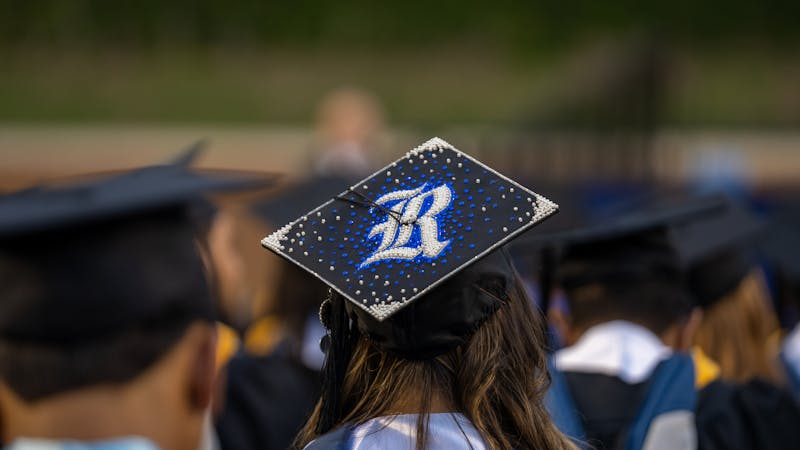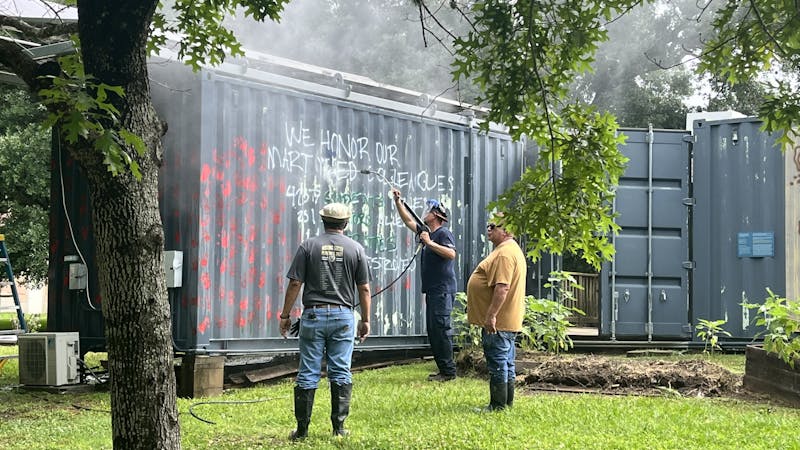Honor Council seeks update
The Honor Council is proposing four separate referendums to amend its constitution in order to clarify both its language and procedures and enlarge the council's size. Students have the opportunity to vote on the referendums during the Student Association General Elections, which begin on Monday and conclude Feb. 14 at 11:59 p.m. Each of the four referendums requires the approval of 75 percent of the student body.The first referendum will update the language of the constitution, which has been amended but not altered since the constitution was written in 1948. Honor Council Chair Hilary Baker-Jennings said the idea for the rewrite came from reading through the constitution and realizing how many parts of it were obscure and outdated. She said this had led to a great deal of confusion among some students.
"The wording changes are very important to get passed because, especially in the last few years, we've had a lot of problems with people not understanding exactly how the Honor Council and the honor system works," Baker-Jennings, a Jones College senior, said.
There are no changes to any of the procedures or rules in this first referendum, Honor Council External Vice Chair Kaleb Underwood said.
"It will update the language, remove anachronistic language, make it easier to read and make it more accessible to both the Rice community and anyone who wanted to read it," Underwood, a Jones junior, said.
The second referendum proposes to expand the size of the Honor Council to accommodate the larger case load caused by the increase in the student body over the past four years. Last year, Underwood said the council heard 50 cases involving 87 students. The referendum will add an additional junior rep, sophomore rep and new student representative, and allow for up to 14 graduate students to serve on the council.
Currently, the council is made up of four seniors, three juniors, three sophomores, two new student representatives and between four and 10 graduate students. Due to the increase in case load, Baker-Jennings said some Honor Council members had to work very long hours, sometimes sitting on multiple panels in one week. Additionally, some hearings had to be postponed because of a lack of available Honor Council members.
"Toward the end of last year particularly, we found we were having a hard time setting panels because people couldn't make it and we had to postpone hearings, which is very unfortunate for the accused student," Baker-Jennings said.
The third referendum clarifies procedure for the handling of Honor Council cases during the summer session. Currently, the constitution only allows for cases to be handled during the summer if there are enough students to have a full Honor Council panel.
Baker-Jennings said that this past summer, there were enough Honor Council members to hear cases during the summer. She said this greatly increased the council's efficiency by preventing cases from being deferred until the beginning of the fall semester. However, she said they also ran into some unanticipated difficulties that they would like to prevent in the future.
Since not enough Honor Council members are always in Houston over the summer, Underwood said the Honor Council wanted to outline alternate procedures. The proposed article dictates the cases be handled in a manner as similar as practically possible to cases during the year, and that if any special changes need to be made, the presiding chair will discuss them with the student.
The accused student has the option to decline and wait until the case can be heard with normal procedure during the summer or the fall. If they choose to wait, this will not affect the subsequent proceedings. If the accused student chooses to accept, the special provisions must be agreed to by the accused student and Senior Judicial Affairs Officer. The referendum includes a timetable wherein the accused student is informed 72 hours before the meeting and has 24 hours to accept.
The fourth and final referendum relates to the appeals process. Currently, one of the four ways a student can appeal is by citing a procedural error, which Underwood said is a very vague term and had led to some misunderstandings among students who had appealed.
"We wanted to update this to show the kind of procedural error that a student should expect an appeal to be upheld for," Underwood said. "The fact that it's been vague has led to disagreement and confusion, so we wanted to make sure what we were talking about when we said procedural error was clear."
For instance, Underwood said if a student was uninformed of his or her right to view the evidence before the hearing and thus could not adequately prepare a case, then the appeal should be upheld. However, if a student receives a letter from Judicial Programs a day late, Underwood said this would not constitute a significant procedural error and would therefore not be grounds to appeal.
The referendum proposes to change "procedural error" to "demonstration of significant procedural unfairness that influenced the outcome of the case."
Underwood stressed that students' rights to appeal were not being taken away.
"You can still appeal for any procedural reason that you want," Underwood said. "It's just clarifying that this is the standard that will be upheld."
According to Underwood, all four of the referendums have been reviewed and approved by Judicial Programs and the General Council's office.
"They've said our wording is good and we are saying what we want to," Underwood said.
Both Underwood and Baker-Jennings urged students to take the time to read and consider the referendums before voting.
"We've talked a lot about this and gotten a lot of input from people about them," Baker-Jennings said. "We think they'd be very helpful to the student body and the Rice community.
More from The Rice Thresher

Rice’s COVID class graduates amid nation-wide campus protests
Rice held its 111th commencement ceremony Saturday, May 4 at Rice Stadium. The class of 2024 walked through the Sallyport, which is currently closed amid ongoing construction of the academic quad, but was temporarily reopened for commencement. For the second year in a row, all undergraduate commencement events were condensed into one day — prior to 2023, ceremonies were typically spread out over a two-day span.

Rice SJP ‘liberated zone’ ends, university removes artwork in ‘beautification efforts’
The “liberated zone” on Rice campus and associated events ended Friday, April 26, after four days of programming, according to the Rice Students for Justice in Palestine Instagram page. Unlike overnight encampments spreading at college campuses across the country, Rice SJP disassembled the “liberated zone” each night and returned the following morning. And in contrast to clashes and escalating police responses that have led to some 2,000 arrests from Los Angeles to Hanover, N.H., there were “no major incidents and no arrests” at Rice, according to President Reggie DesRoches.

Rice’s Luke McCaffrey selected by Commanders in NFL Draft
The Washington Commanders selected Rice wide receiver Luke McCaffrey with the 100th overall pick in the 2024 NFL Draft. McCaffrey was the final pick in the third round, as well as the final pick on the second day of the draft. He’ll compete for a prominent role in the wide receiver room, potentially slotting in as their starting slot receiver alongside Terry McLaurin and Jahan Dotson.

Please note All comments are eligible for publication by The Rice Thresher.